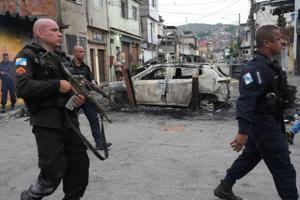A major police operation targeting drug gangs in the favelas of Rio de Janeiro resulted in more than 100 deaths and numerous injuries on March 5, 2024. This daylong raid, described by officials as one of the largest and most violent police actions in recent years, has raised significant concerns regarding public safety and law enforcement practices in Brazil.
The operation unfolded across multiple neighborhoods in Rio’s favelas, where Brazilian security forces engaged in intense gun battles with armed groups. Eyewitnesses reported hearing continuous gunfire throughout the day, as authorities sought to dismantle organized crime networks that have long plagued the region. The scale of the violence has drawn widespread attention, with images circulating that show bodies lining the streets, underscoring the tragic human cost of the confrontation.
Context of the Operation
The Brazilian government has faced mounting pressure to address escalating violence linked to drug trafficking and gang activities. In recent years, Rio de Janeiro has experienced a surge in crime, prompting officials to intensify their efforts to restore order. Critics argue that such military-style operations often result in civilian casualties and exacerbate tensions between law enforcement and local communities.
During this particular operation, security forces utilized helicopters and armored vehicles to navigate the challenging terrain of the favelas, which are often characterized by narrow streets and densely packed housing. Reports indicate that numerous gang members were killed, but the high death toll among bystanders has raised ethical questions about the methods employed by law enforcement.
Reactions and Implications
The response from local residents has been mixed, with some expressing relief at the crackdown on violence, while others lament the loss of innocent lives. Community leaders are calling for a reevaluation of police tactics, advocating for approaches that prioritize dialogue and rehabilitation over militarization.
According to the Associated Press, the operation’s aftermath left many families mourning lost loved ones amid a backdrop of grief and outrage. The Brazilian public continues to grapple with the implications of such violence on their safety and the efficacy of current law enforcement strategies.
As the situation develops, the international community is watching closely, with human rights organizations urging the Brazilian government to investigate the conduct of security forces during the raid. The tragic events of March 5 serve as a stark reminder of the ongoing struggle against organized crime in Brazil and the urgent need for effective and humane solutions.







